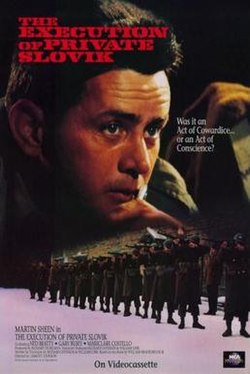The Execution of Private Slovik
| The Execution of Private Slovik | |
|---|---|
 |
|
| Genre | Biography Drama |
| Written by |
William Bradford Huie Lamont Johnson Richard Levinson William Link |
| Directed by | Lamont Johnson |
| Starring |
Martin Sheen Mariclare Costello Ned Beatty Gary Busey Charlie Sheen |
| Music by | Hal Mooney |
| Country of origin | United States |
| Original language(s) | English |
| Production | |
| Executive producer(s) | Richard Levinson William Link |
| Producer(s) | Richard Dubelman |
| Location(s) |
Montréal RMS Queen Mary - 1126 Queens Highway, Long Beach, California |
| Cinematography | Bill Butler |
| Editor(s) | Frank Morriss |
| Running time | 120 Mins |
| Production company(s) | Universal Television |
| Distributor | NBC |
| Budget | $180,000 |
| Release | |
| Original network | NBC |
| Original release | March 13, 1974 |
The Execution of Private Slovik is a nonfiction book by William Bradford Huie, published in 1954, and an American made-for-television movie that aired on NBC on March 13, 1974. The film was written for the screen by Richard Levinson, William Link and by Lamont Johnson who was the director, the film stars Martin Sheen, and also features Charlie Sheen in his second film in a small role.
The book and the film tell the story of Private Eddie Slovik, the only American soldier to be executed for desertion since the American Civil War. The film starred Martin Sheen as Private Slovik, a performance for which he received an Emmy Award nomination for Best Lead Actor in a Drama. Sheen said he did not think actors should be compared, and made it clear he would refuse the award. Many critics and viewers consider this to be one of Sheen's finest performances. Among the other Emmy Award nominations, the film was named for "Outstanding Special". The film also won a Peabody Award.
In 1960 Frank Sinatra announced that he would produce a film adaptation of The Execution of Private Slovik, with the screenplay to be written by Albert Maltz, who was one of the Hollywood 10 blacklisted after they refused to testify to the House Un-American Activities Committee (HUAC) in the McCarthy era. This announcement evoked tremendous outrage, with Sinatra accused of being a Communist sympathizer. As Sinatra was campaigning for John F. Kennedy for President, the Kennedy campaign became concerned and ultimately prevailed upon Sinatra to cancel the project.
...
Wikipedia
